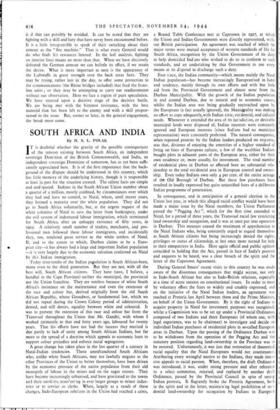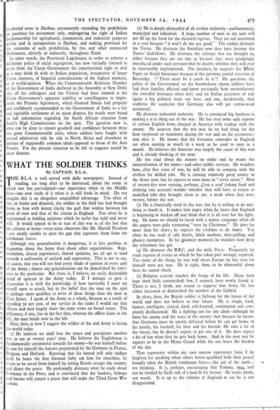SOUTH AFRICA AND INDIA
By H. S. L. POLAK T is doubtful whether the gravity of the possible consequences I of the tension existing between South Africa, an independent sovereign Dominion of the British Commonwealth, and India, an independent sovereign Dominion of tomorrow, has as yet been suffi- ciently appreciated here. It is of the first importance that the back- ground of the dispute should 'be understood in this country, which has little memory of the underlying history, though it is responsible at least in part for the situation created. The salient facts are simple and undisputed. Indians in the South African Union number about a quarter of a million, mostly confined, by circumstances over which they had and have no control, to Natal, where, until recent years, they formed a majority over' the white population. They did not go to South Africa voluntarily, but, at the urgent request of the white colonists of Natal to save the latter from bankruptcy, under the evil system of indentured labour immigration, which terminated for South Africa, after an unhappy existence of fifty years, in rnso. A relatively small number of traders, merchants, and pro- fessional men followed these labour immigrants, and incidentally they, too, rendered great service to the white settlers of Natal. If, and to the extent to which, Durban claims to be a Euro- * pean city—it has always had a large and important Indian population —it is very largely due to the economic salvation conferred on Natal by this Indian immigration.
Today nine-tenths of the Indian pqpulation is South African-born, many even to the third generation. But they are not, with all the best will, South African citizens. They have (save, I believe, a handful in the Cape Province) neither the municipal, the provincial nor the Union franchise. They are voteless because of white South Africa's insistence on the maintenance and even the extension of the race and colour bar, derived originally from the old South African Republic, whose Grondwet, or fundamental law, which we did not repeal during the Crown Colony period of administration, denied, and still denies, equality between white and coloured. It was to prevent the extension of this race and colour bar from the Transvaal throughout the Union that Mr. Gandhi, with whom I worked intimately to that end forty years ago, laboured for twenty years. That his efforts have not had the success they merited is due partly to lack of unity among South African Indians, but far more to the spread of a doctrine which appeals to economic fears to Support colour prejudice and enforce racial segregation.
A great change has taken place in the last quarter of a century in Natal-Indian tendencies. Thefe unenfranehised South Africans who, unlike white South Africans, may not lawfully migrate to the other Provinces of the Union to better themselves, have been driven by the economic pressure of the native population from their old monopoly of labour in the mines and on the sugar estates. They have become increasingly urbanised, and have gravitated to the towns and their outskirts, trans`erring in ever larger groups to minor inClus- tries or to service as clerks. When, largely as a result of these changes, Indo-European relations in lise Union had reached a crisis, a Round Table Conference met at Capetown in 1927, at which the Union and Indian Governments were directly represented, with- out British participation. An agreement-was reached of which the major terms were mutual acceptance of western standards of. life for South Africa, recognition by the Union Government of its duty to help domiciled Indians who wished to do so to conform to such standards, and an undertaking by that Government to use every means at its disposal to discharge such a duty.
Ever since, the Indian community—which means mainly the Natal Indian population—has become increasingly Europeanised in habit and tendency, mainly through its own efforts and with but little aid from the Provincial Government and almost none from the Durban Municipality. With the growth of the Indian population in and around Durban, due to natural and to economic causes, whilst the Indian area was being gradually encroached upon by the Europeans (a fact usually ignored), the Municipality was making no effort to cope adequately,with Indian civic, residential, and cultural needs. Whenever it extended the area of its jurisdiction, or desirable municipal lands were disposed of, Indian interests were constantly ignored and European interests (since Indians had no municipal representation) were constantly preferred. The natural consequence, when repeated protests by the Indian leaders produced no response, was that, desirous of enjoying the amenities of a higher standard of living on lines of European culture, a few of the wealthier Indians bought plots in adjacent parts of the European area, either for their own residence or, more usually, for investment. The total number of residential plots in Durban so affected bore no.substantial rela- tionship to the total residential area in European control and owner- ship. Even today Indians own only 4 per cent. of the entire acreage of the Old Borough 'of Durban. But these few purchases have resulted in loudly expressed but quite unjustified fears of a deliberate Indian programme of penetration.
In consequence, and in anticipation of a general election in the Union last year, in which this alleged racial conflict would have been made a major issue by the Natal members, the Union Parliament passed the " Pegging Act ", which for the first time extended to Natal, for a period of three years, the Transvaal racial law restricting land ownership and occupation, and it was at once put into operation in Durban. This measure caused the maximum of apprehension to the Natal Indians who, being constantly urged to regard themselves as South African citizens but being increasingly denied the rights, privileges or status of citizenship, at last once more turned for help to their compatriots in India. Here again official and public opinion coincided in holding that the Act, passed in face of India's protests and requests to be heard, was a clear breach of the spirit and the letter of the Capetown Agreement.
During General Smuts' recent visits to this country he -was made aware of the disastrous consequences that might accrue, not only to Indo-South African but also to Indo-British relations,. especially at a time of acute tension on constitutional issues. In order to meet by voluntary effort the fears so widely and crudely expressed, and on the initiative of the Natal Indian leaders, an agreement was reached at Pretoria last April between them and the Prime Minister, I on behalf of the Union Government. By it the right of Indians to acquire property in Natal for investment purposes was recognised, whilst a Commission was to be set up under a Provincial Ordinance, d composed of two Indians and three Europeans (of whom one, with legal experience, was to be chairman) to investigate and decide on individual Indian purchases of residential plots in so-called European 11 areas in Durban.. Upon the passing of the Ordinance Durban was to be withdrawn from the operation of the Pegging Act and the V statutory position regarding land-ownership in the Province was to be restored. Unfortunately, it was just that restoration of theoretical h racial equality that the Natal Europeans would not countenance. I Attributing every wrongful motive to the Indians, they made inten- sive appeals to racial passion. When, therefore, the draft Ordinance was introduced, it was, under strong pressure and after reference a to a select committee, rejected, and replaced by another draft C Ordinance, passed by the Provincial Council in spite of strong a Indian protests, It flagrantly broke the Pretoria Agreement, both in the spirit and in the letter, maintain'ng legal prohibition of resi- dential land-ownership for occupation by Indians in European residential areas in Durban, permanently extending the prohibition on purchase for investment only, endangering the right of Indian landownership for agricultural, commercial, and industrial purposes within and in juxtaposition to Durban, and making provision for the extension of such prohibition, by this and other connected Ordinances, directly or indirectly, throughout Natal.
In other words, the Provincial Legislature, in order to enforce a deliberate policy-of racial segregation, has now virtually claimed to wrest from the Union Government the constitutional right to deal as it may think fit with its Indian population, irrespective of larger Union interests, of Imperial considerations of the highest moment, or of world-opinion. When the Commonwealth Relations Member of the Government of India declared in the Assembly at New Delhi that all his colleagues and the Viceroy had been amazed at the Union Government's apparent inability or unwillingness to imple- ment the Pretoria Agreement, which General Smuts had properly and confidently reconunended to the Government of India as a fair and equitable settlement of an acute dispute, his words were based on full information regarding the South African situation from India's High Commissioner on the spot. The question now is, what can be done to restore goodwill and confidence between these two great Commonwealth units, whose soldiers have fought with mutual adthiration side by side in North Africa and elsewhere in defence of supposedly common ideals opposed to those of the Axis Powers. For the present situation to be left to stagnate would be sheer disaster.



























 Previous page
Previous page